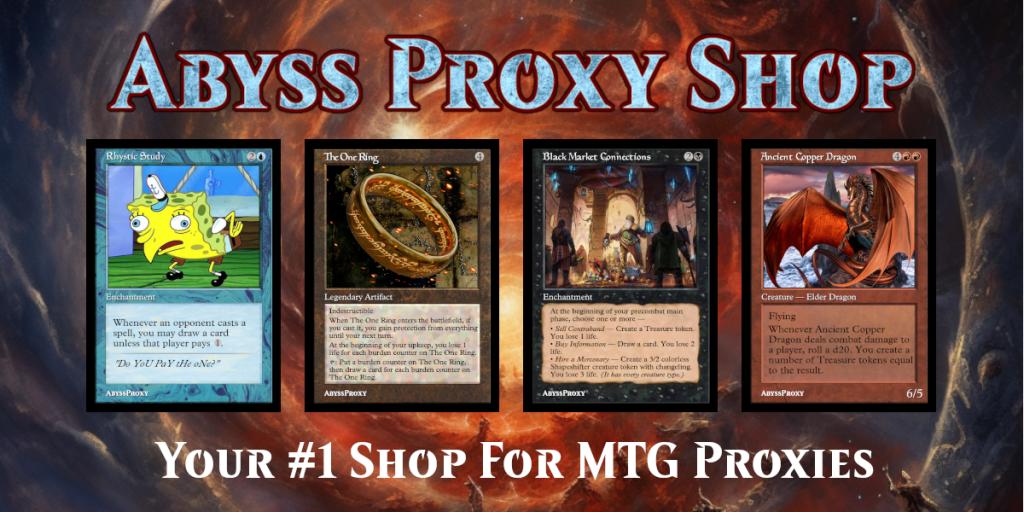If you are new to Magic: The Gathering, you may be unfamiliar with the concept of proxy cards. To put it simply, proxy cards are cards that you can use during gameplay as stand-ins for authentic, original cards. By employing a proxy card, you are using that card to represent the original. With over 20,000 unique MtG cards in existence and new ones being added each year, many cards are difficult, if not impossible, to acquire in their original form. Proxy cards allow you to play a card without owning the original, which can be helpful for a myriad of reasons.
While it is undoubtedly acceptable to create your own MtG proxies by writing the name of the card you wish to represent on a piece of paper or the back of a reversed Magic card, you can also purchase MtG proxy cards that mimic the feel and sometimes the look, of original Magic cards. For some, collecting unique MtG proxy cards can be as fun as collecting authentic Magic: The Gathering cards, mainly because the possibilities are truly endless.
When Can You Use MtG Proxies?
While MtG proxy cards may look and feel remarkably close to their authentic, original counterparts, they cannot be used in every gameplay scenario. Magic: The Gathering proxy cards cannot be used in any version of tournament play, be it an official tournament or a game at your local game store. Competitive play at all levels requires your deck to be fully authentic, and the use of proxies is prohibited.
Though proxy cards are considered illegal in any situation outside of casual play, casual play is the perfect time to use MtG proxy cards for various reasons. So long as you and the other players are all in agreement about using proxy cards, you are free to use them as often as you’d like in casual play. While some people want to use one or two proxies in a deck, others may choose to assemble an entire deck of MtG proxy cards. The choice belongs to the group of players in each individual game setting.
Why Use MtG Proxy Cards?
MtG proxy cards can be helpful for several reasons, but the most common is for players to playtest cards before committing to buying them. Players may wish to test how a card works with their unique deck before spending money to purchase the original for more competitive play scenarios. Additionally, proxy cards may be helpful for new players who wish to play Magic: The Gathering but may be restricted due to the otherwise potentially staggering cost of entry. For casual players who simply want to save money, MtG proxy cards are also an excellent option.
With over 20,000 Magic: The Gathering cards in circulation and hundreds being added annually, it’s virtually impossible for any player to have the opportunity to play with every card they’d like to use. Proxies allow players to enjoy playing with cards they may not otherwise have access to or the opportunity to purchase. After all, the point of any game is for players to have fun, isn’t it? While you could not use these cards in tournament play, it isn’t easy to imagine anything more fun than sitting around your kitchen table and playing MtG with the deck of your dreams, even if only by proxy.
The Impact of Using MtG Proxy Cards
Some Magic: The Gathering players argue that proxying cards have a negative impact on local game stores, which are struggling to stay afloat with each passing year due to competition from online retailers. Still, it’s worth considering that perhaps the opposite is true. Proxy cards open the game up to more players, removing a barrier to entry. More players mean more people who are committed to the game and, over time, are more likely to invest in original cards to play in more competitive settings. Additionally, players who wish to try cards before buying them will turn to their local game stores when possible to make those larger purchases. Local game stores will continue to be the community hubs for MtG, and proxies create opportunities for those communities to grow.
